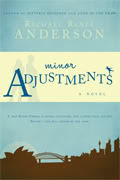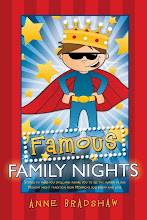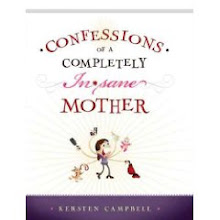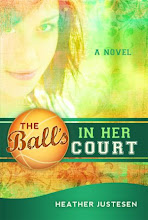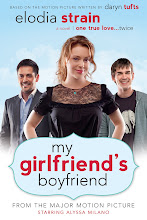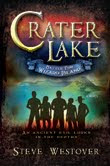
One day, I handed my then 4 year old grandson, Payson, a bat, a ball and a mit. I instructed him to put the bat over his shoulder, then I would hang the mit onto the bat, behind him. Then I placed the ball in his other hand. Once that was done, I told him to walk away from me so I could a picture of him from the back. He gave me this strange look, thrust out his bottom lip and dumped the bat, ball and mit to the ground, slumped his shoulder, dropped his head and began to sulk.
That wasn't quite what I had in mind but it was perfect and I snapped the picture. The next day I borrowed my neighbors ceramic dog, pulled out the paints and canvas and began a the painting that was better than what I had first envisioned. It was perfect. I added broken glass, left out the ball and the painting told it's own story of a little, boy, who accidently hit his ball through the neighbor's window.
Comparatively speaking, that's rather like writing a novel. You start out with what you think is a cool idea and somewhere along with way something happens to change what was first intended, and you find that the accident that changed the path of the novel was amazing and your characters begin to tell their own story. You just add the props.
Comparatively speaking, isn't that the way life is, as well? We start out with an idea and something happens along the way to change that idea and amazing things begin to happen. We just have to add the right props to give our life beauty and promise.
Have a great day
Tuesday, May 25, 2010
Comparatively Speaking
Posted by JoAnn Arnold at 10:18 AM 4 comments
Monday, May 24, 2010
Stress and the Life of an Author
**These are simply my observations, and should in no way be taken as established truths.**
As an author, I dream of deadlines. I long to have an editor pushing me to get my revisions, or my drafts, in by a certain day and time. Yeah, I'm a glutton for punishment. But we do this. We want this. And, if we have a contract and this isn't happening, we (or at least I) can really drive ourselves up the wall.
But, in our heart of hearts, I think we can admit a good deal of the stress we experience as writers is self-inflicted.
I'm not going to tell you that setting goals and deadlines for yourself is unhealthy, because it's not. If you don't, you could well be working on the same novel for 20 yrs. At the same time, we are not above heaping stress upon ourselves for a great number of things.
Let's say we miss that deadline by a week.
Or we make the deadline because we've put off our family to have time to write.
After about ten minutes at the computer, I have horrible upper back pain. It just starts aching, and pretty soon I'll have to get up. I don't do my stretches. I don't see my chiropractor regularly and, sadly, have only had one massage in my life. I'm beginning to think, at least for me, these things are critical in relieving stress and making me a more prolific writer.
The sad thing is I can't offer any real solution for resolving the stress. There may be none. But, perhaps, some of you have ideas on reducing it. Thoughts?
Posted by Cheri Chesley at 10:34 AM 1 comments
Labels: Improving Writing Skills, relaxation, stress in writing
Sunday, May 23, 2010
Make it a Memorable Memorial Day this year!
For most Americans, Memorial Day is a chance to sleep in and get the day off of work or school. If you have children, it’s a terrific opportunity to teach them about our country, respect, honor, reverence, history, and more.
Memorial Day, originally called Decoration Day, is a day set aside for remembrance of those who have died in our nation’s service. Memorial Day was first proclaimed on 5 May 1868 when flowers were placed on the graves of Union and Confederate soldiers. The South, at first, refused to acknowledge Memorial Day, honoring their dead on separate days until after WWI. It is now observed in almost every state of the union on the last Monday of every May. Since the Civil War more than 1.1 million veterans, both women and men, have lost their lives in military service to America.
With four sons in my family, we’ve created a fun tradition with our Cub Scout pack where we place flags on the tombstones of fallen soldiers and then we present a special wreath at the cemetery’s ceremony on Memorial Day. The boys really get a kick out of reading the tombstones and imagining what the soldiers would have looked like. The parents go crazy with their cameras, taking incredibly patriotic photos of their own sons in uniform who are paying respect.
Memorial Day reminds us of our duties towards the wounded soldiers and the bereaved families, orphans and widows of the dead soldiers. In addition to the fun BBQ's and recreational activities next weekend, we should take a few minutes to show our gratitude to those who were willing to make the ultimate sacrifice. Here are a few ways you can honor their memory this year:
Placing flags, garlands or flowers on the grave sites.
Visiting cemeteries and memorials.
Furling the American Flag at half-mast until noon.
Furling the 'POW/MIA Flag'.
Keeping silence for a minute at 3 p.m., 'National Moment of Remembrance' and listening to Taps being played.
Taking a pledge to aid the disabled veterans, widows, widowers and orphans of the dead and keeping it.
Offering thanks to the veterans and appreciating the ultimate sacrifices of the soldiers to the bereaved families personally.
I live for freebies, and here are some that can help you celebrate Memorial Day:
Free Memorial Day quotes, poems, songs, tributes, reflections, presidential declarations and facts: http://www.thememorialdaytribute.com/observe-memorial-day.html
Free Memorial Day essays, speeches, and prayers: http://www.usmemorialday.org/write.html
Free Memorial Day clip art images: http://www.designedtoat.com/memorial_day.shtml
Free Memorial Day ecards:www.memorialsday.com http://www.123greetings.com/ http://www.bluemountain.com/
Free Memorial Day coloring pages: http://hubpages.com/hub/FREE-Coloring-Pages---American-Memorial-Day---Colouring-Sheets-Free-Downloads
Ok, now I can’t ignore the fact that Memorial Day also means the end of school and the beginning of summer vacation for many families in America, so here are a few more fun freebies as you get prepared for some serious fun in the sun!
Free Orlando Vacation Planning Kit: http://www.orlandoinfo.com/vacationkit/
Free Gift Bag from PacSun (5/29) - PacSun on Memorial Day Weekend 5/29: "First 50 in the door when the store opens score a gift bag stuffed with a piece of monster schwag. We're talking music, headphones, clothes, or even trips. BIG trips. How big? Check 'em out..." http://shop.pacsun.com/content.jsp?pageName=summer
Free Limeade at Taco Bell valid through 7/11/2010 or until 500,000 free Limeade Sparkler online coupons are redeemed, whichever occurs first. http://www.tacobell.com/promo/limeade-coupon
Free One-Year Subscription to ELLE Elle reports on emerging trends in fashion, beauty and style. Its visual core is surrounded by features, news and analysis of the larger world. Its articles feature information on culture, health, politics, art and relationships. http://www.freebizmag.com/emailelle02welcome.htm
Chick-fil-A Free Spicy Chicken Sandwiches 5/21 Chick-fil-A is giving a limited number of FREE Spicy Chicken Sandwiches to customers who make a reservation. To make your reservation, visit this offer beginning Friday, May 21 and choose your preferred Chick-fil-A Restaurant location and time. http://www.getspicychicken.com/
Dice: Hundreds of the Latest Technology Magazines Hundreds of the latest technology magazines offered by Dice technology magazine center in association with Mercury Magazines. Tell them about yourself, choose up to three magazines and complete subscription forms. http://www.mercurymagazines.com/pr1/111/111158
Have a wonderful Memorial Day weekend next week!
Posted by Movie Review Mom at 10:01 AM 1 comments
Labels: family history, flag, free, Memorial Day, patriotic, Scouts
Friday, May 21, 2010
Visions of farm accidents
For those who didn't know, in addition to being a writer, I'm also an EMT in my hometown. The last week of every month we have training where we learn new skills or review things we know (and quarterly we also have pass-offs of all our skills and the 
Tonight, however, we drove out to some farms and learned about extricating people from accidents with tractors and balers and other large equipment. I still couldn't tell you what all of the machines are called, but I got a crash course on what could go wrong on farm equipment. One of the EMTs and her husband--who runs a farm--got some volunteers to get bloodied (with fake blood) up as victims, and put together some fake bodies to take the place of victims who probably wouldn't survive the accidents (no actual people were harmed in the scenarios, though several were really cold from lying on the ground, and any number of clothes were damaged beyond repair).
We went through each scenario discussing what the EMTs injury concerns would be, what the firemen could do to help us, to extricate the patients and solve problems while we cared for the patient. After it was all over, I heard one of the EMTs saying to Lindsey, who put it all together, "Wow, you must have a really twisted brain to come up with all of those situations." I kept the fact that I had been wondering about how I could use one of the scenarios in a story to myself. She didn't need to know how seriously twisted I was, after all.
After Jeff told us that he and three other farmers stood around the baling machine that morning discussion how someone might have an accident with it and not end up dead, I realized farms are a magnet for danger. I could write a real horrific suspense story on one of those places!
Okay, now to the point of all of this (besides the fact that it was just plain fascinating). EMTs have to learn new skills and keep their current skills up to date. In the same way, I need to keep my writing skills honed, and learn new ones all the time. I read Lisa Mangum's new book The Golden Spiral this week and she said in her acknowledgments that in writing her second book, she learned every new book is different. They have to be treated like a different book because what works for one doesn't work for the next one.
Just because I've been to ten or eleven conferences now doesn't mean I've learned everything there is to learn about writing (I learned plenty at the LUW spring workshop last weekend). This is an ongoing process and I can't afford to become comfortable with the same kinds of skills that I've used in the past.
What worked for my first couple of books isn't going to be enough for the next one, and though I can use the skills I've already learned, I need to keep improving, keep searching for better ways to work my craft, better ways to express myself, new and unique ways to kill people off (If there are so many on a farm, just imagine where else you could find a few!).
Posted by Heather Justesen at 10:43 AM 1 comments
Labels: Heather Justesen, improve your writing, Improving Writing Skills, inspiration to write, learning, personal growth, real life
Tuesday, May 18, 2010
Wrong Number by Rachelle J. Christensen
I just finished reading Wrong Number. I thought it was excellent. Rachelle does a great job with the suspense. She also made me feel like I was there experiencing everything with the main character. I enjoyed the book and loved the "inside jokes" contained in the story. Did anyone catch the interesting thing about the cover? Come on, I'm sure someone noticed the fun little thing the cover designer did.
If you like suspenseful mysteries, you'll definitely want to check out Rachelle's book.
If you're like me, you probably don't read for pleasure anymore. You probably deconstruct the story, right? You can admit it.
What I thought Rachelle did well: she ended the chapters with a cliffhanger. She made me want to keep reading to the next chapter and the next chapter and the next chapter after that. It wasn't always a big thing, but it was enough to make me turn the pages to keep reading (even when I needed to make dinner or clean house).
Another thing I thought she did well was her use of description. I could "see" what was going on. She didn't delve into three pages of description, but she included enough to make me envision what was happening. That's something I need to do better in my own writing. I sometimes forget that readers don't have a direct connection to the inside of my brain, (good thing, it might scare them) and that I need to describe more of what I see in my head.
I really enjoyed this book, not only for the story elements, but for what it taught me as a writer. I think that's why it's so important that as writers we read, read, read. Sure, we can enjoy it along the way, but we can also learn from our colleagues.
What books have you read lately that made you reconsider something in your writing?
Posted by Rebecca Talley at 12:49 AM 3 comments
Labels: Leanring from other writers, Rachelle Christensen, Reading, Wrong Numer
Monday, May 17, 2010
The Value of Doing Hard Things
During her awesome Writing a Killer Query workshop at this past LDStorymakers conference, the esteemed Elana Johnson gave some advice that goes beyond querying, beyond writing, and applies to life in general.
"This is really hard," she said on at least three occasions. "But that's okay, because you can do hard things."
Looking back on my life, I see that choosing to do hard things is what helped me grow the most.
I thought about this the other day when I was visiting someone who lived on the side of a hill. Their driveway and parking area resembled a roller coaster, and I ended up parked on a steep slope in my truck. My truck with the manual transmission.
This wasn't the first time I'd been in this situation, stopped on the side of a steep hill.
Years ago when I was learning to drive, and just about to take my driver's license test, our big old family station wagon gave up the ghost. Irreparably dead.
As a replacement, my parents bought a cute little Datsun. Cute as it was, however, this car scared me to death - because right between the front two seats sat a stick shift.
Now, I desperately wanted to get my license. I was already seventeen (which is another story altogether) and the prom was coming up, so I took a crash course in driving with a manual transmission and hurried off to the testing center.
Needless to say, I did not do well. It was bad enough that I stalled in the parking lot with the examiner next to me, followed by trying to start from a stop sign in third gear. But then, at the end of the test (which I had undoubtedly already failed) my sadistic examiner took me to The Hill.
Two-thousand feet straight into the air, The Hill shot up at an eighty-five degree angle, and there was a stop sign perched right at the top.
Okay, maybe it wasn't quite that steep, but to a stick-shift flunky it sure looked that way. And there really was a stop sign at the top. I did my best, only rolling back about fifty feet while gunning the engine and easing out the clutch.
We got back to the testing center and set up an appointment for me to retake the test.
Now, I was a pretty good driver. Every single one of the things I failed on that test came directly from my inexperience with the manual gearbox. If I had taken the test in an automatic, I would have passed with flying colors.
Which is why it was such a temptation when our neighbors offered to let me borrow their car to retake the test. Oh, it was tempting. Really, really tempting. After all, a license was a license, and it didn't matter what kind of transmission I used to get it.
And yet somehow I felt as though using a different car would be like cheating. Maybe it was stubbornness, or maybe it was vain and foolish pride, but for whatever reason I determined that I would pass my test in the little Datsun, with the stick shift.
I practiced and practiced and then went down to take the test. At the end the examiner said. "Much better." In my mind I cheered! And then he said, "Next time, do these other things, and you'll pass."
My heart sank. I'd failed yet again. Which meant I rode to my Junior Prom stuck in the back seat of someone else's car.
But that second failure gave me an even stronger incentive to master that transmission, and I practiced and I practiced and I practiced, and that meant when I finally did pass my test two weeks later it was with a nearly perfect score.
It also means that I learned - really learned - to drive a stick, and I have never been intimidated by a stop sign at the top of a hill ever again.
Writing is hard. Querying is hard. Marketing is hard. Facing rejection after rejection is hard.
But, as my friend Elana says, that's okay. Because you can do hard things.
Posted by Don at 12:01 AM 6 comments
Labels: Donald J Carey, LDStorymakers
Thursday, May 13, 2010
Good "Taste"

Caramel Pecan Cheesecake from The Diet Rebel's Cookbook: Eating Clean and Green by Jillayne Clements and Michelle Stewart
One of the things I enjoy doing in life is creating yummy whole food recipes. Of course, my favorite recipes to make are healthy desserts. When I say healthy desserts, sometimes people look at me funny because to them, "healthy" means low fat, aspartame sweetened food that's supposed to resemble the desserts they're used to.
But when I say healthy, I mean food that's nutrient dense because it's made with whole food ingredients--such as natural sugars with all their micronutrients intact (including those that help with blood sugar stabilization), whole grains that have been prepared in a way to increase vitamin content and create vitamin C (something that regular whole grain doesn't have, and something that refined grain flour definitely doesn't have), and fat from the right sources (because fat is essential for healthy brains and warmth and fat soluble vitamin absorption, and also helps to slow the absorption of sugar into the blood stream, so in essence, "low fat" or "fat free" does not equal healthy.)
What is the result of eating desserts and other food made from whole food ingredients vs. food from refined? For starters, your body is being nourished and satisfied on less. Desserts made this way tend to have a lighter flavor, and they are not as addicting because they are gentler on the blood sugar levels. Refined foods can be addicting because even though the fullness is there, a lot of the nutrients (the real reason why we eat in the first place) are missing. This creates cravings and a desire to get those nutrients through other sources, even though we know we shouldn't be hungry.
I have heard many people say that they "feel good" after eating my dessert creations, and not in the I-just-ate-a-bunch-of-sugar-so-now-I-feel-like-giggling-until-the-high-wears-off-and-then-I-become-grouchy way. They mean it in the that-was-Divine-tasting-and-yet-I-feel-satisfied-and-nourished kind of a way.
It is possible to nourish and build up the body while at the same time keeping the taste buds happy.
The reason I mention all this is because I believe this ties into books as well. There have been books I have read over the years that were highly entertaining (delicious) and yet when I was done, I was left feeling empty or down. On the other hand, there have been books I have read that have left me with a feeling of satisfaction, edification, or a desire to live my life better. With all the junk in the entertainment field, I'm so thankful for publishers such as Cedar Fort who believe that books should not only be of good "taste" but that they edify and uplift as well.
This is what I strive for as an author and as a preparer of whole foods, and it is how I strive to live as a human being. I have created a "blogsite" my blog that's set up like a website with different "pages" that incorporates this message. The content throughout the pages--which include writing tips, cooking tip/recipes, and wellness--is designed to uplift and encourage or nourish. Please feel free to visit and give feedback. www.jillayneclements.blogspot.com
Posted by Jillayne Clements at 12:45 PM 2 comments
Labels: edifying, entertaining, good books, nourishing, whole foods
Monday, May 10, 2010
Happy Mother's Day!
The first word my 4th son learned when he was about one year old was "Mama". He didn't say another word until he was two. I felt like the most important person in the world to be given such an honor. Moms are usually the ones who teach us to speak and to read. While I hope my children will remember the many times I read books to them when they were little, the reality is that what they do remember are the many times I fell asleep trying to read to them because I was utterly exhausted! Not until then did I fully appreciate my own mother.
So what gift could we possibly give to our mothers who have sacrificed and given so much? One of the most luxurious treats a mom can receive is a hot bubble bath with soft music playing in the background, candle light, a piece of decadent chocolate, and a good book to read while soaking in the tub. It's even more relaxing if she knows the kids are being taken care of and the dishes are done. (Hint, Hint) Oh yeah, and flowers!
What a mom REALLY wants for Mother's Day is to know that her children are good and that they're going to contribute to making the world a better place. All mothers want to leave a legacy of love. You can show your mom that her love will continue long after she's gone by the way you treat other people and the earth.
Words are powerful things. The words that leave your mouth reveal your character and values. Make sure they include "I love you" and "Thank you" today. For a little inspiration as you write your Mother's Day card, check out the following web sites:
http://www.mothersdaypoems.info/
www.dayformothers.com/mothers-day-poems/index.html
http://www.mothersdaycelebration.com/
www.poemsforfree.com/mothersdaypoems.html
Have a wonderful day!
Posted by Movie Review Mom at 10:15 AM 0 comments
Labels: inspiration to write, motherhood, Reading, words
Today, I vow...
Monday seems to be the perfect day to renew the promises we make to ourselves when it comes to our writing. I know it works for me. Lately, despite all the fabulous advice I've gotten from conferences and author signings, I find myself letting physical barriers prevent me from reaching my set writing goals. Like my laptop--I can't use it like a laptop anymore. The power cord (second one) is failing, so it has to be on a flat surface in order to work--with the cord wrapped tightly underneath to maintain a taut connection. It's also having serious software issues, and I know I'm going to have to scrape together some money to get it fixed soon.
But I had a solution to that problem. I can either move the laptop to the desk or simply use the desktop. Have I done it? No. Why? Well, my shoulder has been acting up and causing me a great deal of pain. Sitting at the desk will only make it worse.
See what I mean? On the surface, they seem like legitimate reasons. But in reality all you're looking at are excuses. My mind is about to burst with all my characters have been throwing at me. But I haven't put it down.
The truth is none of us is ever going to find that perfect groove; the moment in the day where we're free to write without distraction in that ideal spot in our world. It doesn't happen. Those moments don't fall into our laps. We have to make them happen. And sometimes, we have to fight for them.
So, what goals are you putting off? Let's all work to make them happen.
Posted by Cheri Chesley at 9:10 AM 2 comments
Labels: making your writing better, procrastinating, Setting Goals, Writing Goals
Saturday, May 8, 2010
Good Advice from Anita Stansfield
By Christine Thackeray
Two weeks ago I went to the Storymakers Conference and although I was taught many great things, it was the words of Anita Stansfield that have stuck with me over and over during that time. I was so impressed by her honesty on what it takes to be a writer/full-time mom and the keys to making it work for the whole family that were, for me, priceless. Here's a brief overview of MY PERCEPTION of what she said. I'm sure that if Anita read this she would go... "I didn't say that." Yeah, I've added my two cents, so here goes.
PRIORITIZE:
She began by saying that the first thing you need to do is decide your priorities. In order to be a writer she realized she had to sacrifice a lot. She asked us to write down what is most important in our lives, not in large sweeping categories, but specific subcategories. For me, the first four are: Relationship with God, my husband, my children, church callings and writing. Soccer mom, PTO participant, cub committee volunteer (unless it's a calling), scrapbooking, interior designer, gardener, etc. all take a back seat right now.
CUSTOMIZED CONSISTENCY:
Next she said that you have to have a writing goal and that you must write everyday. While SOME authors have a daily minimum, when you're caring for a family, you may not have the ability to be that rigid. Look at your other obligations realistically and set your goal so it challenges you but doesn't bankrupt yourself or the family. Some weeks will be strong writing weeks but if you've got kids with needs you may have to put the writing aside except for a half hour or so.
IT'S ABOUT RESPECT:
THIS ONE I LOVED!!!!! Anita said that it was important her husband and children respected what she did. (Now this is me) Some mothers are huge scrapbookers, some love to sew, some care so much about the house that the kids have to take off their shoes before they can step in the door and aren't allowed in the front room but on special ocassions. Other's spend hours prepping meals and cooking. Whatever gifts you mother has, kids and spouses need to respect their contribution. For writer's it means allowing her to have the time to complete a project. When the final edits come, everyone has to work together so that she can finish. This is something you have to teach your family- that writing is part of who you are and as long as you keep it in balance with other responsibilities, your family needs to respect this part of you.
FILLING NEED:
In order for the above respect to work, as a mother you must show equal respect to your spouse and children. We do this by fulfilling their needs. Anita said she keeps a list of her children's names. When they come home from school, she asks each child, "What do you need?" When they say "Nothing" and sulk away, she realizes they made just need her time but usually they know if they don't ask, it won't happen. When she is ready to take a break, she goes down the list and follows through so her children know they can count on her. After discussions with her husband, he agreed he doesn't need a perfect house but he does need a clean path to the bathroom and dinner on the table when he comes home. (We are married to very similar men, I think.) It's unrealistic to think with the time she takes writing that she would be able to keep the house perfect all the time but she can fill need and get everything done she wants and NEEDS to.
WHAT YOU GIVE UP
Anita was very honest that you give up a lot to be a consistent writer. She said it had been years since she sat down and watched TV. She said that she could never be one of those moms who do everything because she was writing. There have been many times where she had to say no, but she said her children have ALWAYS known she loves them and that they are more important than her writing, but her writing is important enough to sacrifice for and she has.
I want to publicly thank Anita Stansfield for her great advice. It really is a sacrifice but writing is part of me that I can't deny and it's cool that my sweet family has given me that opportunity to pursue it. Now I need to start that list thing.
Posted by Christine Thackeray at 9:45 AM 2 comments
Labels: Christine Thackeray, Enhancing Writing, priorities
Friday, May 7, 2010
Making and Breaking Goals
Things have been hectic in my neck of the woods--or rather, they've been hectic keeping me away from my neck of the woods, which has made trying to complete my writing goals difficult (but maybe if I weren't so easily distracted that wouldn't be such a problem). After the Storymakers' conference I decided that on days I don't have other large commitments that I need to make a goal to write at least 3,000 words. That's less than two hours of writing if I plan what's coming next while I'm cooking, cleaning, or gathering eggs--that should be totally doable most days, even if I do have a five-hour commitment?
Of course, when you take out the days when I had to be out of town for work or book signings, Sundays, and the day I had a long patient transfer on the ambulance, it didn't leave a lot of extra days for writing.
On day 1 I managed 3,145 words.
Day 3 I squeezed out 1,450--I'm still not sure where the rest of the day went, but by the end I was just glad to have written *something*.
Day 5 I wrote 7,000! Woot! the only problem is it was on the wrong MS! Of course, I do need to work on Danny's story, but it wasn't the one I was SUPPOSED to be writing on (Though the new first chapter totally rocks, though, so my local monthly critique group will be excited to see it next week). *sigh*
Today I had intended to get some writing done (I don't count my numerous blogs), but there was animal housing to rearrange, cakes and bread to bake, a kitchen to clean up, and a zillion, trillion little things around the house that weren't done because I was out of town for a few days.
I have this beautiful goal of having a rough draft done on Grayson's book before the end of June. That should give me time to do a quick rewrite on it (or at least makes notes about rewrites) before I finish Shelly's book with my critique group and have to have a new project. Now if I could get Danny and Tia (and her irritating mother) to stop yapping at me and feeding me new scenes and situations I didn't realize existed in their story, I could focus on Grayson and the project he and Olivia are about to undertake, and the secrets they're both keeping.
It can get pretty noisy in my head when all of my characters start talking, but I'm going to use a firm hand on this one and make Danny and Tia wait for a while. Olivia has some big-sister meddling to do.
Posted by Heather Justesen at 6:56 PM 0 comments
Labels: First Drafts, Heather Justesen, Writing Goals
Thursday, May 6, 2010
The Blind Side
My sister told me to see it. My best friend told me to see it. But as life goes, it wasn’t until it was #1 in my Netflix queue and arrived in my mailbox that I actually saw this critically-acclaimed film.
Let me just say: I loved it! Loved every moment. The fifteen I spent in tears. The five I spent laughing. The ninety I spent lying in bed after it was over, thinking about resilience, about love, about doing something. I quickly got online and found a copy of the book the movie is based on.
A day later, I heard about a reality show starring one of the teen suspects in the highly-publicized slew of celebrity home burglaries. This show follows the life this teen. It shows her buying clothes, getting pedicures, and visiting her attorney.
No one is telling me to watch this show, and I’m not thinking I’m going to, I’m sorry to say.
As a storyteller, I pay a lot of attention to the stories being told--whether it be on book or magazine pages; or on movie, TV, or computer screens. There is great power in stories. And for me, the stories that show us the good in the world, and in turn, touch the place in our souls that makes us want to add to that good are those that need to be told more and more.
It is a great joy to be a writer, a storyteller. But for me, I also feel a great responsibility. To take the good of what I’ve seen, and sometimes the good of what I’ve hoped, and make sure it makes it to the pages of my books. To make sure that even though my characters may like their pedicures, I always acknowledge that cute feet are only as good as the path they’re walking.
So, here’s to walking a good path, lending a good hand, and being the best of what we’ve read and seen and heard in the stories that shape us, day after day.
Posted by Elodia Strain at 10:30 PM 2 comments
Labels: movies, reality TV
Tuesday, May 4, 2010
What Makes a Bestseller?
by Rebecca Talley
What makes a bestseller? Is it ingenious marketing? A riveting story? Who you know?
I've been pondering this question. I think it's two-fold. First, and foremost, we must have a strong story, one that's worth reading. We can, and should, continuously hone our craft by attending conferences, taking classes, reading how-to books, and reading other novels. Each subsequent book we write should be better than the last and we should strive to always improve our writing. But, is that enough?
Even if we write a stellar book, who will read it if no one knows about it? Along with writing that amazing book, we also need promotion and marketing. We need to get the word out and let the world know we have this spectacular book. We can do this through blog tours, interviews, signings, emails lists, contests, websites, etc.
But, what about when we do all this and we still don't have a bestseller? Is there a "secret?"
What do you think?
Posted by Rebecca Talley at 7:16 AM 4 comments
Labels: Bestsellers, Marketing, Writing a Bestseller, Writing Books
Monday, May 3, 2010
Funny thing about humility. Just when you think you've got it, you've lost it . . .
by Rachael Renee Anderson So a friend asked me to take a look at her manuscript. Aside from correcting a few minor grammatical errors, I also reworded things, crossed out sentences or paragraphs I felt were unnecessary, and even added phrases. I felt like I was helping to improve her work, make it better, or simply show her what I would do.
So a friend asked me to take a look at her manuscript. Aside from correcting a few minor grammatical errors, I also reworded things, crossed out sentences or paragraphs I felt were unnecessary, and even added phrases. I felt like I was helping to improve her work, make it better, or simply show her what I would do.
Then, as fate would have it, a discussion on the ANWA critique boards caught my attention. It concerned the word “was” and the general consensus seemed to be that most writers considered it somewhat of an evil word—or at least far too passive to be used overly much. Considering the first sentence of my current WIP is: “He was a baby,” I took an interest in the discussion, even submitting my sentence as a “How would you change this?” example.
One author wrote me back, asking for more information, and eventually came back with a “I would write it like this” suggestion. Now, to some people, her suggestion might have been a good one, but for me, it was a no-go. It sounded much too dramatic and rather silly for my tastes.
It was then that I came to the shameful realization that I had gone about critiquing my friend’s manuscript the wrong way. I was trying to change her “voice” to match mine, and how pompous was that? Each book/author is unique because of their voice, and I was trying to take that away from my friend’s work.
So the next time she asked me to take a look at a few chapters (can you believe she asked me again?), I changed the way I “critiqued.” I tried to take a “reader’s” perspective, rather than a “writer’s.” Instead of making changes to her book, I would write, “this sentence doesn’t flow well for me,” or “I’m still confused here,” or “Love this! Now you’ve made me wonder about . . .”
That way, she could analyze her manuscript from a fresh perspective—what someone might think having never read her book before or know anything about her story. It allowed her to fix troubled spots in her own way—not my way. It enabled her to retain her voice.
So my shout-out to all writers is this: Amplify that voice of yours, make it the best you possibly can, and don’t ever listen to anyone who wants to change it. No one can do it justice the way you can. After all, isn’t that what makes books so amazing? Not one of them are alike—thanks to the unique voice of each and every author.
Posted by Rachael Anderson at 8:48 AM 1 comments
Labels: Rachael Renee Anderson
Saturday, May 1, 2010
Peek in the Past--Yay for Pitman's!
We lived in Hale, Cheshire, England for the rest of my years at home. Gradually, as I grew through teenage years filled with school activities (homework, sports, and exams), childhood dreaming gave way to more adult activities like dating, going to secretarial college, and job hunting.
I have to admit, grammar school was a happy time for me. I didn’t want it to end, but at the same time, couldn’t help feeling excited at the freedom ahead , and getting away from rules and regulations (or so I thought).
The first thing I did was join a drama club. It seemed like a natural progression from creating stories to actually living them. My acting wasn’t very good, and I had trouble learning lines, and projecting my voice, and keeping a straight face; but apart from that I really enjoyed myself. I was in several shows, either backstage or onstage, and learned more about life during that time than any previous year.
My mind opened to areas I’d never before considered. Unfortunately, not all of them were good. I learned about different lifestyles, viewpoints, ethics, and behaviors. I also learned not to judge, not to drink alcohol or smoke cigarettes, and not to believe everything at face value.
This maturing process continued long after leaving the drama club, and laid the foundation for some core beliefs that eventually brought religion into my life—a story for another post.
Secretarial college in Manchester was not my idea of fun. Book keeping was part of the curriculum, and since mathematics in any form froze my brain, I was always bottom of that class. Learning to type on those heavy old manual typewriters was another pain. But I’m grateful for the experience. It for sure came in handy when I began serious writing much later.
My saving grace was Pitman’s shorthand. At that I excelled. Those cunning little shapes caught my imagination and I soon learned to write them fast. The only problem was translating them back—an important skill if anyone was ever going to hire me. I doubted that pages of squiggles would impress, no matter how fast I wrote them, if I couldn’t type them back equally fast. It all came together, eventually.
And so I became a secretary, ready to explore the world. America was as far as I got, but more about that another day.
Posted by Unknown at 6:01 AM 4 comments
Labels: Anne Bradshaw, England, mathematics, Peek in the Past, Pitmans, shorthand, typing










